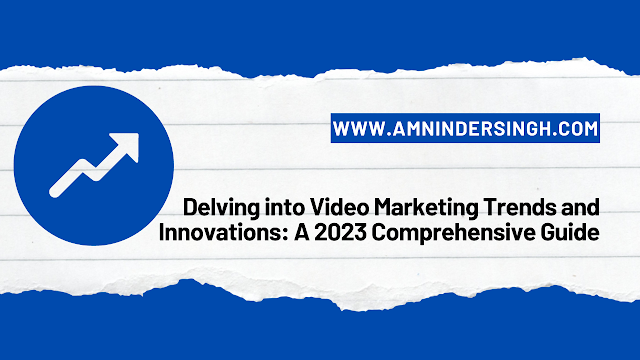In the rapidly evolving landscape of digital marketing, staying updated with the latest video marketing trends and innovations is crucial for engaging audiences effectively.
This comprehensive guide explores the most recent developments in video marketing, helping you leverage these trends to create impactful campaigns.
Introduction to Video Marketing Trends
1.1 The Dynamic Nature of Video Marketing
Video marketing constantly evolves as technology, consumer behavior, and platforms change. Staying up-to-date with trends ensures your campaigns remain relevant and effective.
1.2 Why Embrace Video Marketing Trends?
Embracing trends enables you to:
Stay Competitive: Stand out in a crowded digital landscape.
Engage Audiences: Appeal to evolving viewer preferences.
Drive Results: Leverage innovations for better ROI.
Short-Form Video Content
2.1 Rise of Short-Form Videos
Short-form videos, typically under 60 seconds, are gaining immense popularity due to their snackable format and quick engagement.
2.2 Platforms Driving Short-Form Video Growth
Platforms like TikTok, Instagram Reels, and YouTube Shorts are at the forefront of short-form video content.
2.3 Crafting Compelling Short-Form Content
Create attention-grabbing short-form videos by focusing on concise storytelling, visuals, and strong hooks.
Live Video Dominance
3.1 The Surge in Live Video
Live video offers real-time engagement, making it a preferred choice for connecting with audiences authentically.
3.2 Live Streaming Platforms
Platforms like Facebook Live, Instagram Live, and Twitch provide versatile options for live streaming.
3.3 Strategies for Engaging Live Audiences
Interact with viewers through real-time comments, Q&A sessions, and behind-the-scenes glimpses to enhance engagement.
Interactive Videos
4.1 The Appeal of Interactive Videos
Interactive videos enable viewers to engage with content, making the viewing experience more immersive and enjoyable.
4.2 Implementing Interactivity in Videos
Use clickable elements, quizzes, polls, and branching narratives to make videos interactive and engaging.
4.3 Benefits and Engagement Metrics
Measure engagement through interactions such as clicks, choices made, and completion rates to gauge the effectiveness of interactive elements.
Personalized Video Marketing
5.1. The Power of Personalization
Personalized videos tailor content to individual viewer preferences, increasing engagement and conversion rates.
5.2 Collecting and Using Data for Personalization
Gather data on viewer behavior, preferences, and demographics to create personalized video campaigns.
5.3 Personalized Video Campaign Examples
Explore examples of successful personalized video campaigns that resonated with viewers on a personal level.
Vertical Video Format
6.1 The Vertical Video Phenomenon
Vertical videos, optimized for mobile viewing, have become popular on platforms like Snapchat and Instagram Stories.
6.2 Optimizing for Vertical Viewing
Design videos with vertical orientation in mind, ensuring content fits mobile screens and provides a seamless experience.
6.3 User Experience and Engagement
Consider how vertical videos impact user experience and engagement, especially on mobile devices.
Video SEO and Discoverability
7.1 SEO Strategies for Video Content
Implement SEO techniques to improve the discoverability of your video content on search engines and platforms.
7.2 YouTube SEO Best Practices
Leverage YouTube’s algorithm by optimizing video titles, descriptions, tags, and thumbnails.
7.3 Leveraging Video Transcriptions
Use video transcriptions to enhance accessibility, SEO, and user experience while making content more comprehensible to a global audience.
Embracing Virtual Reality (VR) and Augmented Reality (AR)
8.1 Immersive Experiences with VR
Explore the potential of virtual reality to create immersive and unforgettable brand experiences.
8.2 Enhancing Reality with AR
Leverage augmented reality to engage users by overlaying digital information onto the physical world.
8.3 Practical Applications in Marketing
Discover how VR and AR are being used in marketing campaigns, from virtual product try-ons to interactive brand experiences.
Inclusivity and Accessibility in Video
9.1 Accessibility Considerations
Ensure your videos are accessible to all viewers, including those with disabilities, by providing captions, audio descriptions, and accessible player controls.
9.2 Creating Inclusive Video Content
Produce content that respects diverse audiences by avoiding stereotypes and promoting inclusivity.
9.3 Compliance with Accessibility Standards
Adhere to accessibility standards such as WCAG to ensure your video content complies with legal requirements and provides an inclusive experience.
User-Generated Content (UGC) and Community Building
10.1 Harnessing the Power of UGC
Encourage your audience to create content related to your brand, building a sense of community and trust.
10.2 Building Brand Communities
Foster online communities where fans and customers can engage with each other and your brand, creating a loyal following.
10.3 Showcasing UGC Effectively
Use UGC strategically by sharing it on your channels, featuring it in campaigns, and acknowledging and rewarding contributors.
Legal and Ethical Considerations
11.1 Copyright and Licensing
Respect intellectual property rights by obtaining proper licenses for music, images, and other copyrighted materials used in videos.
11.2 Privacy and Data Protection
Handle viewer data with care, ensuring compliance with privacy regulations like GDPR and CCPA.
11.3 Ethical Video Marketing Practices
Adhere to ethical marketing practices, including transparency in advertising, honest representations, and responsible data handling.
Monitoring and Adapting to Trends
12.1 Continuous Monitoring
Stay vigilant by monitoring industry news, tracking competitors, and analyzing your own performance metrics.
12.2 Experimentation and Adaptation
Experiment with new trends and technologies in controlled campaigns to see what works best for your audience.
12.3 Staying Ahead of the Curve
Maintain a forward-looking approach, always seeking opportunities to innovate and adapt to emerging video marketing trends.
Video Marketing Trends and Innovations : Conclusion
Embracing video marketing trends and innovations is essential for staying competitive and engaging audiences effectively in the dynamic digital landscape.
By continually exploring and implementing these trends, you can create compelling video campaigns that resonate with your target audience, drive results, and position your brand as a leader in the ever-evolving world of video marketing.
This article is a part of Video Marketing Module.
Module 10: Video Marketing
10.1 Delving into Video Marketing Trends and Innovations
10.2 Mastering Video Production and Editing Techniques
10.3 Dominating the YouTube Marketing Landscape
10.4 Embracing the World of Live Streaming
10.5 Analyzing Video Performance Using Data-Driven Metrics

